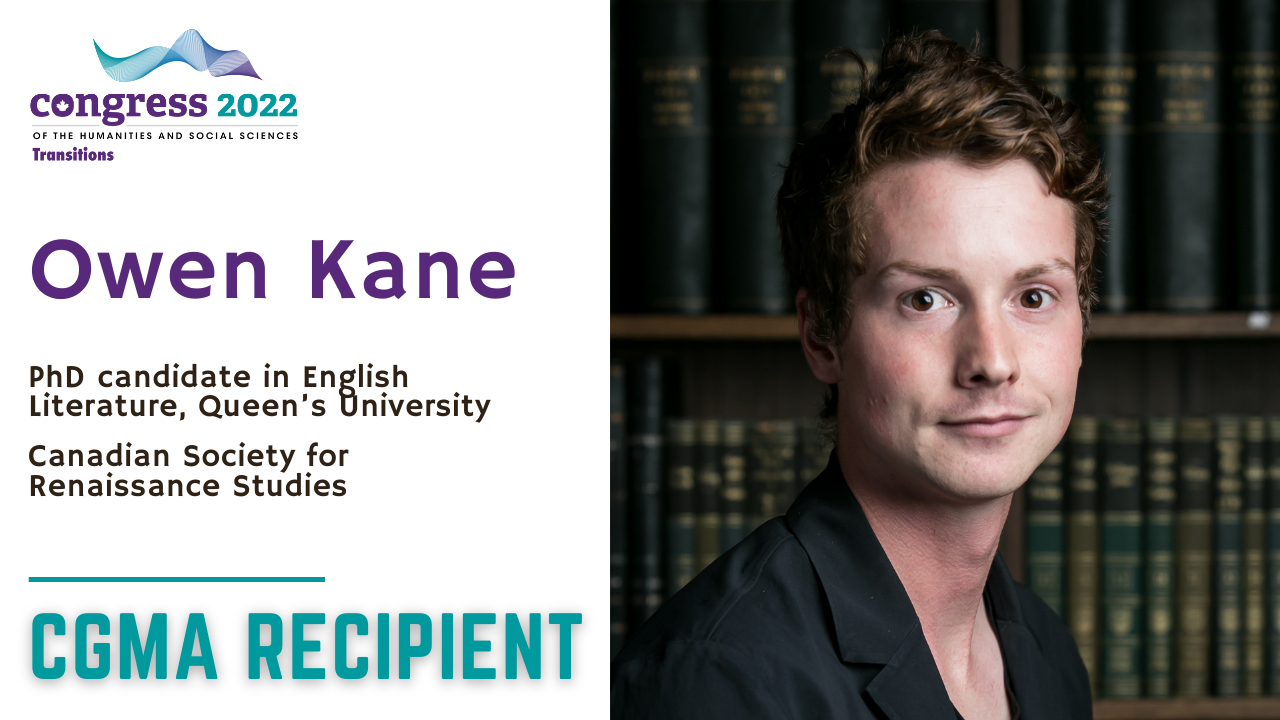Nominated by member scholarly associations of the Federation for the Humanities and Social Sciences, the 2022 Congress Graduate Merit Awards recognize exceptional graduate students who will be presenting their work at the Congress of the Humanities and Social Sciences.

Tell us about yourself.
Owen Kane is a Ph.D. Candidate in English Literature at Queen’s University, writing about poetic decorum and the early modern English political imagination. His recent work engages how civility and decorum were imagined in northern climates and landscapes, and how Renaissance world-making about the Arctic transformed discourses of early modern English civility and conduct in London.
Which scholarly association(s) are you currently a member of?
- Canadian Society for Renaissance Studies
- Associate of College and University Teachers of English
- Modern Language Association
- Renaissance Society of America
- Milton Society of America
- International Spenser Society
- Shakespeare Association of America
At which conference(s) will you be presenting and/or attending?
Canadian Society for Renaissance Studies
What is the title of your Congress 2022 presentation?
“no light but rather darkness visible”: English Civility and Transitional World-Making in the Renaissance Arctic
How would you describe the research you will be presenting at Congress 2022?
My paper explores the North as represented in Renaissance English travel writing and exploration narratives and how they transformed ideas of poetic imagery, pictorial space, and world-making. I read conventional literary tropes regarding winter, ice, and cold together with emerging scientific and religious thought to examine how writers constituted civility and nationhood in a geography that challenges earlier claims about the Arctic as a blank, contemplative space. The presentation seeks out what forms of civility and nationhood were seen to be possible in the Arctic, asking: how did Renaissance English authors impose order on a landscape that resisted their mapping?
How does the research you will be presenting connect with the Congress 2022 theme, Transitions?
The Far North was viewed by English writers in the Renaissance as a transitional space for the expansion of civility, nationhood, and world-making. I propose that writers who projected the Arctic as the “meta incognita” or “unknown shore” developed a unique poetics promoting the flourishing of English civility in an environment previously thought to be hostile to it.
What is your favourite part of the Congress experience?
My favourite part of the Congress experience in previous years has been attending sessions and association conferences outside of my field of research. I’ve learned so much from listening and engaging research work presented across fields. For me, the great joy of the Congress meeting has been making connections with other researchers and putting our engagements into conversation.
Share your hopes for Congress 2022.
I’m most looking forward to learning from my colleagues and celebrating their research. I hope that the conversations and new research interests that come out of sharing the papers will continue long past the end of each session.
